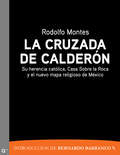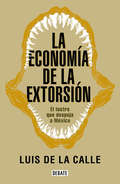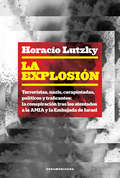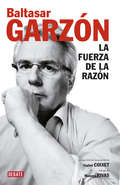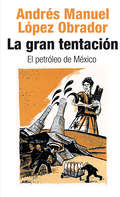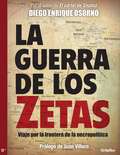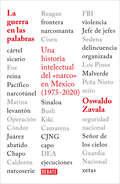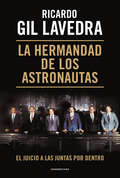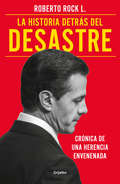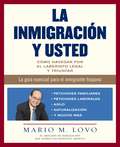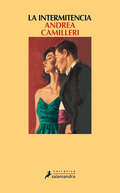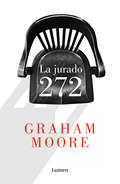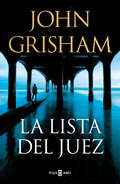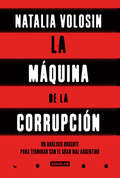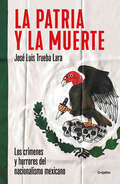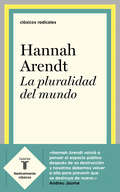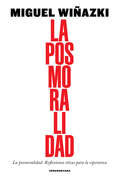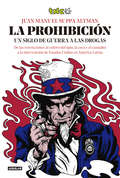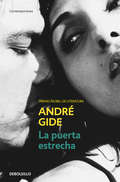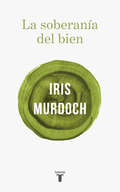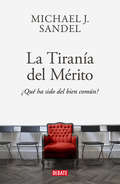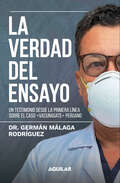- Table View
- List View
La cruzada de Calderón: Su herencia católica, Casa sobre la Roca y el nuevo mapa religioso de México
by Rodolfo Montes"La guerra contra el narcotráfico, lanzada por el presidente Felipe Calderón, se basa en una concepción religiosa, en la que ha jugado un papel central la secta conocida como Casa sobre la Roca (CSR), cuyo dirigente, Alejandro Orozco Rubio, es funcionario federal y su esposa, Rosa María de la Garza, es diputada federal del PAN." Revista Proceso Las relaciones peligrosas del presidente con un grupo cristiano. El 3 de noviembre de 2006, Felipe Calderón asistió a un encuentro de fieles pentecostales del grupo religioso Casa Sobre la Roca en la ciudad de México. Uno de los objetivos del flamante presidente era agradecer a los líderes y miembros de ese movimiento cristiano su apoyo en las controvertidas elecciones. En el curso de la reunión, el titular del Ejecutivo adoptó un discurso de corte mesiánico y les aseguró a los participantes que Dios le había encomendado la misión y la orden de luchar contra el flagelo del narcotráfico. Al final,como si se hubiera convertido en una especie de iluminado, el político michoacano pidió: Oren por mí. El episodio anterior puso en evidencia el acercamiento de Calderón con una rama del cristianismo, primero en busca de votos y después pagando los favores con puestos. Éste es el punto de partida de La cruzada de Calderón, una investigación periodística que aborda el ángulo menos conocido de las políticas públicas de la actual administración federal, sobre todo en materia de seguridad y combate a la delincuencia organizada. La tesis principal del autor es que detrás de algunas estrategias gubernamentales se halla un inquietante fundamentalismo religioso que no sólo atenta contra el carácter laico del Estado, sino que ha orientado procedimientos fallidos que han costado demasiadas vidas y que no han tenido ningún resultado tangible. Bernardo Barranco, reconocido especialista en temas religiosos y sociales, explica en su introducción los pormenores del papel quedesempeñan actualmente los grupos pentecostales de clase alta en México, el coqueteo de Calderón con ellos a partir de una ambición política desmedida, y cómo el asunto ha provocado un cisma en el interior del Partido Acción Nacional.
La economía de la extorsión: El lastre que despoja a México
by Luis De la CalleLa extorsión no es sólo una mancha en nuestro sistema. Es nuestro sistema. O, al menos, el peor compañero de viaje posible: uno que nos despoja a cada paso y nos sumerge en la incertidumbre. La extorsión no es sólo una mancha en nuestro sistema. Es nuestro sistema. O, al menos, el peor compañero de viaje posible: uno que nos despoja a cada paso y nos sumerge en la incertidumbre. En México, extorsiona el viene-viene para #cuidar# el coche, extorsiona el líder sindical al amenazar con huelgas a mansalva, extorsiona el burócrata que exige una #ayuda# para destrabar un trámite, extorsiona el gerente de una trasnacional al pedir moches, extorsiona el político que solicita un porcentaje para soltar una concesión... La extorsión permeó en prácticamente todas las capas de nuestra sociedad y hoy define buena parte de nuestra economía y nuestras políticas. Su impacto es brutal y causa una profunda desigualdad, no sólo en ingresos y oportunidades, sino en el acceso a los derechos más básicos. México, hoy, no se entiende sin este flagelo. Con todo rigor, Economía de la extorsión desmenuza el problema, nos presenta todas sus facetas y nos alerta del futuro que nos espera de seguir por esa vía.
La explosión: la conspiración tras los atentados a la AMIA y la Embajada de Israel
by Horacio LutzkyEl encubrimiento de los servicios de inteligencia de varios gobiernos, los más altos funcionarios del poder político argentino de los años 90, agentes de la SIDE y de la Policía Federal de los atentados a la Embajada de Israel y la AMIA. Aburrida en una guardia inmobiliaria, una mujer encuentra en un placard un impreso con información comprometedora sobre el atentado a la AMIA ocurrido en Buenos Aires en 1994. El título la estremece: Expediente bomba: el Irán-Baires-Bosnia-gate. Bajo el formato de una ficción, Horacio Lutzky, coautor del exitoso Iosi. El espía arrepentido, narra la trama secreta que terminó en la voladura de la mutual judía y las razones del encubrimiento del atentado. La explosión es el relato de una investigación escalofriante que, en el contexto de la guerra de los Balcanes, revela los hilos del contrabando de armas y explosivos en el que participaron traficantes y terroristas sirios, agentes iraníes, criminales de guerra nazis, importantes autoridades políticas y comunitarias argentinas, militares e integrantes de las fuerzas de seguridad, y algunos jueces, con el visto bueno de políticos y dirigentes israelíes y estadounidenses.
La fuerza de la razón
by Baltasar GarzónUna larga entrevista del gran escritor gallego Manuel Rivas a Baltasar Garzón sobre el acoso que ha padecido y que le ha acabado expulsando de la Audiencia Nacional. Este libro es el resultado de un ofrecimiento, una colaboración y un deseo. Isabel Coixet se ofreció a filmar un documental, Manuel Rivas accedió a colaborar y Baltasar Garzón quiso hablar por primera vez de la situación por la que estaba pasando, y de toda su trayectoria. Al presentar esa entrevista, ampliada y actualizada, La fuerza de la razón es un documento fundamental para entender la historia reciente de la justicia en España, desde la operación Nécora al caso Gürtel, pasando por la liberación de Ortega Lara o la detención de Pinochet, y para comprender el modelo de justicia que se pretende imponer y por qué se quiere apartar de su labor a una de las figuras más destacadas de la España democrática. «Creo que la fuerza de la razón, frente a la razón de la fuerza, siempre debe imponerse sobre cualquier tentación de los que disponiendo del poder, lo utilizan arbitrariamente.»
La gran tentación: El petróleo de México
by Andrés Manuel López ObradorEste libro plantea una pregunta fundamental para el desarrollo del país: ¿Por qué el gobierno quiere privatizar Pemex como un asunto de vida o muerte, y por qué hay que oponerse? La gran tentación: el petróleo de México, escrito por Andrés Manuel López Obrador y editado por Grijalbo, es una obra, sólida y concisa, con apenas algo más de 200 páginas, y se suma, por méritos propios, a la bibliografía fundamental sobre el tema petrolero en México. El título, surgido -se precisa- de una conversación del cha Reza Pahlevi con Ryszard Kapuscinski, muestra que, al menos en los últimos 100 años, la idea de controlar los hidrocarburos del país ha constituido, para los países dominantes y las corporaciones petroleras, la gran tentación. El libro se organiza en tres grandes secciones. La primera proporciona un recuento analítico de la historia del petróleo en México, desde las primeras explotaciones, hace algo más de un siglo, en el porfiriato, hasta 1982. La segunda aborda el periodo de alrededor de un cuarto de siglo, del predominio de las políticas neoliberales. En el sector petrolero, de manera cada vez más clara y por completo evidente a partir del nuevo siglo, estas políticas se han orientado a colocar sus recursos al servicio de intereses no sólo distintos, sino contrarios a los de un desarrollo nacional autónomo y participativo. La tercera se refiere a la esperanza. A las opciones abiertas por el Movimiento en Defensa del Petróleo, orientadas a convertir los hidrocarburos -el petróleo y el gas- en el fundamento de un desarrollo diferente, de un modelo alternativo, que sirva a los mexicanos y, por el bien de todos, primero a los pobres.
La guerra de Los Zetas: Viaje por la frontera de la necropolítica
by Diego Enrique OsornoAl investigar las particularidades de lo que se podría denominar el "enigma Z", Diego Osorno advierte los riesgos que corre el país en los años venideros ante un potencial crecimiento desmedido de esta organización criminal. "Diego Enrique Osorno pertenece a la estirpe de los grandes testigos que presencian la aniquilación y escriben la historia para que no se repita." JUAN VILLORO. En el año 2000, cuando el PRI dejó al fin la presidencia de México, en el noreste del país nacieron Los Zetas, una banda que entonces parecía una anécdota fugaz del mundo del narco. Doce años después, el PRI regresa al poder y Los Zetas parecen eternos mientras libran una guerra contra el cártel de Sinaloa, la organización criminal más fortalecida durante los gobiernos panistas. En esta aproximación inédita a una región fronteriza que a diferencia de Tijuana y Ciudad Juárez ha sido poco documentada, Diego Enrique Osorno recorre los sitios que han padecido los mayores estragos de violencia causados por la guerra declarada por Felipe Calderón. En un itinerario que abarca pueblos y ciudades de Nuevo León y Tamaulipas, el autor habla con pobladores, generales, jóvenes sicarios, alcaldes, periodistas, policías, empresarios, migrantes, familiares de desaparecidos y vendedores de armas. Consigue información reveladora, entre la que destacan las confesiones de Óscar López Olivares, el Profe, quien, junto a Juan Nepomuceno Guerra y Juan García Ábrego, fundó el cártel del Golfo. Su relato en voz propia ofrece claves cruciales para conocer la raíz histórica de lo que sucede hoy en día. Así, a lo largo de este viaje, el lector va conociendo cómo durante la transición democrática fallida ocurrió el colapso de la añeja narcopolítica del PRI con la nueva necropolítica del PAN. En definitiva, La guerra de Los Zetas arroja luz sobre los secretos del lugar donde se libra la batalla más importante del México del inicio del siglo XXI.
La guerra en palabras
by Oswaldo ZavalaUna historia intelectual de la hegemonía que funcionó como la plataforma para lanzar la “guerra contra el narco”: primero desde un plano simbólico y después como una campaña permanente de violencia organizada. Basado en una investigación de archivos oficiales, reportajes periodísticos, estudios académicos y producciones culturales sobre el tráfico de drogas, Oswaldo Zavala revisa el arco histórico del lenguaje en el que se inscriben un relato de guerra con personajes intercambiables en lugares variables que configuran la ilusión sobre el “narco” en nuestra sociedad contemporánea, con atención especial en los productos culturales sobre el tráfico de drogas en general. .
La hermandad de los astronautas: El Juicio a las Juntas por dentro
by Ricardo Gil LavedraUn grupo de magistrados jóvenes ante el mayor desafío de sus vidas y de la incipiente democracia: juzgar a los comandantes de la dictadura. A meses de recuperada la democracia, la sociedad asiste atónita al develamiento de un masivo y atroz plan criminal. A pesar de las amenazas de los cuarteles y las presiones de sectores del poder, seis jueces y dos fiscales ponen en marcha un juicio que sería un hito para la Historia del país y un ejemplo para el mundo. «Sabíamos que dependíamos de nosotros mismos, que nada ni nadie nos iba a ayudar. Éramos seis tipos muy distintos. Sin embargo, aun en esa diversidad teníamos las mismas convicciones sobre la justicia, sobre la necesidad de restaurar el estado de derecho, sobre la necesidad de asegurar la vigencia plena de la ley. Lo que siguió, el juicio, la sentencia, la amistad entrañable que se consolidó entre nosotros, fue la consecuencia de lo que pudimos hacer con lo que traíamos de nuestras propias historias, más la relación que construimos en aquellos días y para siempre. Detrás de los hechos históricos siempre hay explicaciones racionales: procesos, contextos, factores predecibles, las fuerzas de la Historia. Pero también está lo fortuito, lo humano. Las cosas que se producen misteriosamente en un momento dado, con las personas y sus circunstancias. Cuando, de algún modo, todos los planetas se alinean».Ricardo Gil Lavedra
La historia detrás del desastre: Crónica de una herencia envenenada
by Roberto Rock L.El país se desmoronó día a día, durante seis años. Hoy pagamos las consecuencias. El sexenio pasado es recordado por su rastro de corruptelas, omisiones, opacidad y complicidades. Enrique Peña Nieto empezó su encargo como un salvador de México y lo terminó como uno de los presidentes peor valorados en la historia del país: como un símbolo de corrupción e insensibilidad. En esta obra -la más profunda que se haya hecho sobre el gobierno pasado- Roberto Rock emprende la crónica de ese desastre. Y son los propios protagonistas quienes admiten: el regreso del PRI al poder fue una calamidad. Esta investigación reconstruye los hitos y los personajes que marcaron la época que recién ha concluido. Quedan al desnudo las reformas estructurales, Elba Esther Gordillo, Ayotzinapa, Videgaray, Osorio Chong, La Casa Blanca, Meade, Anaya y López Obrador, entre otrosmuchos...
La historia detrás del desastre: Crónica de una herencia envenenada
by Roberto Rock L.El país se desmoronó día a día, durante seis años. Hoy pagamos las consecuencias. El sexenio pasado es recordado por su rastro de corruptelas, omisiones, opacidad y complicidades. Enrique Peña Nieto empezó su encargo como un salvador de México y lo terminó como uno de los presidentes peor valorados en la historia del país: como un símbolo de corrupción e insensibilidad. En esta obra -la más profunda que se haya hecho sobre el gobierno pasado- Roberto Rock emprende la crónica de ese desastre. Y son los propios protagonistas quienes admiten: el regreso del PRI al poder fue una calamidad. Esta investigación reconstruye los hitos y los personajes que marcaron la época que recién ha concluido. Quedan al desnudo las reformas estructurales, Elba Esther Gordillo, Ayotzinapa, Videgaray, Osorio Chong, La Casa Blanca, Meade, Anaya y López Obrador, entre otrosmuchos...
La inmigracion y usted: Como Navegar Por El Laberinto Legal Y Triunfar (Vintage Espanol Ser.)
by Mario LovoLa fuente de información inmigratoria más autorizada hasta la fecha, escrita por uno de los abogados más respetados de la nación.Dirigida exclusivamente al mundo hispanoparlante, La inmigración y usted es una guía esencial que resuelve todas las dudas relacionadas con las leyes inmigratorias de Estados Unidos. Desde el ciudadano americano que desea auspiciar a un familiar hasta el inmigrante que necesita legalizar su status, esta obra ofrece a todo el mundo la información necesaria para adentrarse en el complejo mundo de las visas, la residencia permanente y la ciudadanía americana. Escrita por Mario Lovo, el prestigioso abogado inmigratorio del programa Despierta América, esta obra pone especial énfasis en los asuntos de inmigración más comunes entre la comunidad hispana, tales como: El logro de la residencia a través de un familiarLa obtención de una visa de trabajoLos requisitos necesarios para obtener el asilo La participación en la Lotería de Visas El cumplimiento de los formularios requeridos para cada visa El modo de conseguir la ciudadanía americana La mejor manera de lidiar con la Corte de Inmigración La petición de visa en caso de residir fuera de Estados Unidos Cada uno de los capítulos de La inmigración y usted explica con detalle cómo proceder, paso a paso, durante el proceso de solicitud de visa. En ellos encontrará reproducciones de todos los formularios claves junto con su traducción al español, consejos para evitar los errores más comunes cometidos por los solicitantes y respuestas a las preguntas más frecuentes sobre cada visa. Relatado en un lenguaje sencillo y de fácil comprensión, La inmigración y usted es un libro imprescindible para todo inmigrante que sueña vivir mejor y de manera más segura en Estados Unidos.
La inmigracion y usted: Como navegar por el laberinto legal y triunfar (Vintage Espanol Ser.)
by Mario LovoLa fuente de información inmigratoria más autorizada hasta la fecha, escrita por uno de los abogados más respetados de la nación.Dirigida exclusivamente al mundo hispanoparlante, La inmigración y usted es una guía esencial que resuelve todas las dudas relacionadas con las leyes inmigratorias de Estados Unidos. Desde el ciudadano americano que desea auspiciar a un familiar hasta el inmigrante que necesita legalizar su status, esta obra ofrece a todo el mundo la información necesaria para adentrarse en el complejo mundo de las visas, la residencia permanente y la ciudadanía americana. Escrita por Mario Lovo, el prestigioso abogado inmigratorio del programa "Despierta América", esta obra pone especial énfasis en los asuntos de inmigración más comunes entre la comunidad hispana, tales como: El logro de la residencia a través de un familiarLa obtención de una visa de trabajoLos requisitos necesarios para obtener el asilo La participación en la Lotería de Visas El cumplimiento de los formularios requeridos para cada visa El modo de conseguir la ciudadanía americana La mejor manera de lidiar con la Corte de Inmigración La petición de visa en caso de residir fuera de Estados Unidos Cada uno de los capítulos de La inmigración y usted explica con detalle cómo proceder, paso a paso, durante el proceso de solicitud de visa. En ellos encontrará reproducciones de todos los formularios claves junto con su traducción al español, consejos para evitar los errores más comunes cometidos por los solicitantes y respuestas a las preguntas más frecuentes sobre cada visa. Relatado en un lenguaje sencillo y de fácil comprensión, La inmigración y usted es un libro imprescindible para todo inmigrante que sueña vivir mejor y de manera más segura en Estados Unidos.From the Trade Paperback edition.
La intermitencia
by Andrea CamilleriUn thriller descarnado, de ritmo implacable, en el que sus protagonistas aparecen reducidos a los instintos más básicos que motivan sus actos: el deseo, el odio, la venganza, o sea, en definitiva, la pura y dura erótica del poder. La empresa Manuelli constituye un potente conglomerado que sostiene la economía de Italia y da trabajo a miles de personas. Y su director general, Mauro de Blasi, un ejecutivo que hace gala de toda la firmeza, la elegancia diplomática y la ferocidad que exige el cargo. Sin embargo, Mauro tiene un problema: últimamente padece una especie de «apagones neurológicos» en los que, durante unos segundos, no oye, se le nubla la vista y se queda paralizado, como si no estuviera presente. No obstante, a pesar de estos paréntesis forzosos, Mauro pergeña un plan para absorber Artenia, una compañía mucho más pequeña que está al borde de la quiebra, mediante una operación maquiavélica que debe procurarle una buena tajada. Pero no todo se desarrolla de la forma prevista... Una serie de personajes -desde un subdirector de personal amante de la poesía y una mujer con pocas luces hasta una joven hermosa e inteligente y una secretaria fiel pero demasiado confiada- se erigen en incómodos obstáculos e interfieren en los planes del corrupto Mauro de Blasi. El gran maestro Andrea Camilleri nos adentra en un entorno sacudido por la crisis económica, proclive a excesos e irregularidades de todo tipo so pretexto de que «todo vale» para sobrevivir en circunstancias tan difíciles. Reseña:«Sin caer en las trampas de la retórica ni en las insidias morales, Camilleri aborda en La intermitencia la situación de la Italia actual. Con una prosa reflexiva y milimetrada, y diálogos muy incisivos, esta novela es un alegato contra quienes enarbolan siempre la bandera de los triunfadores.»SoloLibri
La jurado 272
by Graham MooreLA VERDAD ES LA MEJOR DEFENSA, PERO ¿CUÁL ES LA VERDAD? UN THRILLER LEGAL PARA HACER HISTORIA, POR EL GANADOR DEL OSCAR AL MEJOR GUION EN DESCIFRANDO ENIGMA «Descarga una jeringuilla de adrenalina en el corazón de Doce hombres sin piedad y obtendrás La jurado 272»A. J. Finn, autor de La mujer en la ventana Jessica, la hija adolescente del gran magnate de Los Ángeles Lou Silver, desaparece mientras volvía a casa del colegio. Su profesor, Bobby Nock, un afroamericano de veinticinco años, se convierte en el principal sospechoso cuando salen a la luz unos mensajes ilícitos que había intercambiado con la alumna y se halla sangre de la víctima en su coche. El proceso judicial se convierte en el más mediático de la última década. La fiscalía cree estar ante un caso sólido y fácil de ganar, pero Maya Seale, una joven que forma parte del jurado popular, está convencida de la inocencia de Bobby y comenzará a influir en el resto de los miembros para declararlo no culpable. Esta controvertida decisión, que cambiará el destino de todos para siempre, es cuestionada diez años después, cuando el caso se reabre y la carrera de Maya, ahora abogada de prestigio, se tambalea. Y también se verán sacudidas las vidas, llenas de secretos, de los jurados y la de la propia familia Silver, mientras se ha perdido todo rastro de Bobby. Inspirándose en su propia experiencia como miembro de un jurado, el ganador del Oscar al mejor guion por Descifrando enigma nos impacta con «un thriller legal desenfrenado con giros ingeniosos y flashbacks sorprendentes. Moore combina con gran destreza la impecable construcción de personajes con revelaciones cada vez más explosivas en una historia que parece hecha para la gran pantalla» (Library Journal). «El thriller imprescindible del año.»The Sunday Express Reseñas:««Una excelente novela que dirige una mirada mordaz al sistema judicial norteamericano, al escrutinio de los medios, al racismo. Moore ha inventado un nuevo canon para los thrillers legales.»Publishers Weekly «El thriller imprescindible del año.»The Sunday Express «Una trama adictiva y un ritmo vertiginoso.»Booklist «El thriller más apasionante que he leído en más de una década.»Sophie Hannah «El ritmo imparable e hipnótico mantiene al lector pegado a las páginas.»Crime Time «Brillante. [...] La trayectoria de Moore como guionista explica lo bien que está construida la trama y la excelente caracterización de los personajes. Thriller del mes.»The Sunday Times «Descarga una jeringuilla de adrenalina en el corazón de Doce hombres sin piedad y obtendrás La jurado 272.»A. J. Finn «Enormemente entretenido.»The Observer «Un thriller judicial desenfrenado con giros ingeniosos y flashbacks impactantes. [...] Moore combina de manera experta la diestra construcción de personajes con revelaciones cada vez más explosivas en una historia que parece hecha para la gran pantalla.»Library Journal «Enrevesado, rítmico y con un desenlace del que la propia Agatha Christie hubiese estado orgullosa.»Shots E-Mag «Una tensa, emocional, sobresaliente lectura que me enganchó hasta la última página.»Caroline Kepnes
La justicia y sus puñetas: Nueva antología del disparate judicial
by Paco Pardo Quico Tomás-ValienteUna mirada lúcida y entretenida a la justicia española. Disfruta de esta crónica afilada de una sociedad que se retrata en sus juzgados y tribunales. La toga, el reconocible uniforme de trabajo de los jueces, se caracteriza por un sobrio color negro que contrasta con los blancos puños bordados que rematan sus mangas. El origen de estas puñetas, protagonistas indiscutibles de su vestimenta, se remonta a varios siglos atrás y encierra un simbolismo interesante, pues su confección, al igual que las sentencias de los magistrados que las llevarían, requería de un importante esfuerzo de concentración y habilidad, así como de una labor concienzuda y delicada, comparable a la de los togados. Esos blancos puños bordados con filigranas y encajes simbolizan aquí las sentencias que se desvían de los rectos caminos de la Justicia e, incluso, del simple sentido común.A lo mejor eso les valdrá a los autores el calificativo de puñeteros, pero están dispuestos a asumirlo. ¿Cómo pudo un tribunal considerar probado que un farmacéutico tocaba las nalgas de sus empleadas y las besaba sin su consentimiento, mientras les proponía compartir siesta en un hotel y, no obstante, anular la condena por acoso sexual que había impuesto un juzgado madrileño? ¿Cómo puede considerar el Constitucional que demoler tu casa no supone ninguna violación del domicilio? ¿Y cómo puede ser condenada una lesbiana como hombre? ¿O considerar un juez que «si a una mujer bien vestida la ves, maltratada no es»? Casos como éstos, recogidos en este libro por dos veteranos periodistas de tribunales, podrían ser motivo suficiente como para mandar a la Justicia... a hacer puñetas. En cualquier caso, con toda seguridad, serán razón suficiente paradisfrutar de la lectura amena de esta crónica afilada de una sociedad que se retrata en sus juzgados y tribunales.
La lista del juez
by John GrishamUn thriller lleno de tensión y con una premisa impactante:¿y si un asesino en serie buscado durante más de veinte años fuera un juez en ejercicio? Lacy Stoltz se ha encontrado en numerosas ocasiones frente a problemas de corrupción en su trabajo como investigadora de la Comisión de Conducta Judicial de Florida. Pero nada la ha preparado para el caso que una asustada pero decidida desconocida quiere poner en sus manos. El padre de Jeri Crosby fue asesinado hace veinte años. Su muerte sigue sin resolverse pero Jeri tiene un sospechoso al que ha estado siguiendo de manera obsesiva durante dos décadas. En el camino, ha descubierto otras víctimas. Sus sospechas son firmes pero las pruebas parecen imposibles de conseguir. El culpable es inteligente, paciente y siempre va un paso pordelante de la policía. Es el más brillante de los asesinos en serie. Conoce los procedimientos, el trabajo de investigación y, sobre todo..., conoce la ley. Se trata de un juez de Florida de la jurisdicción de Lacy. Y tiene una lista con los nombres de todos sus objetivos, personas inocentes que han tenido la mala suerte de cruzarse en su camino y ofenderle de alguna manera. ¿Podrá detenerle Lacy sin convertirse en su próxima víctima? La lista del juez es la más sorprendente y escalofriante novela de John Grisham hasta la fecha. Sobre la novela han dicho:«Una de las mejores novelas de suspense del año. Un impactante libro de primer nivel que hará que merezca la pena que pases toda la noche en blanco hasta acabarlo».The Wall Street Journal «El mejor autor vivo de thriller».Ken Follet «Además de lashabituales virtudes de Grisham: una idea llamativa, una trama impecable y una vívida panorámica social, lo que aquí resulta impresionante es su disposición para afrontar nuevos desafíos».The Sunday Times «Las sorpresas no dejan de llegar rápidas y en abundancia en este elegante thriller con el que es imposible parar de leer».The Sun «Un excelente thriller repleto de tensión trepidante».Irish Independent «De lectura obligatoria».SAGA Magazine
La máquina de la corrupción: Un análisis urgente para terminar con el gran mal argentino
by Natalia VolosinEn un análisis del pasado y la actualidad, Natalia Volosin, la experta más importante sobre corrupción de la Argentina, descubre cuáles son los orígenes y las consecuencias de un mal que mantiene al país al margen de la ley, y aporta una salida institucional real y posible. ¿Por qué a los argentinos se nos considera corruptos? ¿La corrupción es una excusa de la derecha? ¿Es un mal de la izquierda? ¿Es un rasgo cultural que llevamos en la sangre o responde a fallas estructurales de nuestra democracia? ¿Las empresas son víctimas de los políticos o son parte del problema? ¿Por qué la justicia no lo resuelve? ¿Qué tiene que ver la corrupción con nuestra historia de autoritarismo y subdesarrollo? ¿Cómo afecta a los más vulnerables? En un revelador análisis del pasado y de la actualidad, Natalia Volosin, la experta más importante sobre el tema en la Argentina, demuestra que a la máquina de la corrupción no le importa el modelo económico ni el partido que gobierna. Para la autora estamos, como a fines de los 90, ante una gran oportunidad de atacar en serio un conflicto que no resiste más improvisación ni hipocresía. Para hacerlo, propone reformas institucionales profundas y una salida por arriba de la grieta que vincula la corrupción a los derechos humanos. Es hora de preguntarnos, de verdad, si queremos seguir viviendo al margen de la ley.
La patria y la muerte: Los crímenes y horrores del nacionalismo mexicano
by José Luis Trueba LaraTras la brutalidad de la Revolución, los sobrevivientes necesitaban una esperanza y el nacionalismo se la dio. Pero a un costo altísimo: muerte y mentira. El discurso oficial asienta que el amor a México es obligatorio, eterno, inamovible y perfecto. No es así. El actual nacionalismo mexicano es una invención posrevolucionaria, fomentado para crear un sentido de unidad y de propósito tras la matanza vivida entre 1910 y 1917. Y eso es lo de menos. Ese patriotismo fue una excusa para perpetrar algunas de las peores atrocidades que se han cometido en suelo patrio. Discriminación, racismo, clasismo y exclusión son sus caras menos oscuras. Las peores se llaman odio, expulsión, destierro, asesinato y genocidio. Esta obra señala el negro camino que ha seguido la devoción hacia México y la impunidad de la que ha gozado. Hoy, como nunca, se vuelve necesario reflexionar sobre el tema de esta obra: ¿a qué deliriosnos puede llevar el nacionalismo desatado?
La pluralidad del mundo
by Hannah ArendtLa obra de Hannah Arendt sintetizada en esta antología esencial e imprescindible. No hay nada más radical que un clásico. Hannah Arendt, la gran pensadora del siglo XX, es sin duda fundamental para afrontar los desafíos del XXI. Abordó todas las cuestiones clave de su tiempo, desde el antisemitismo hasta el totalitarismo, los orígenes de la democracia, la crisis de la autoridad, los fundamentos de la educación y la estética o el problema del mal en la modernidad. Toda su obra está sintetizada en esta antología esencial e imprescindible. ------------- radical: adj. Perteneciente o relativo a la raíz. «Clásicos Radicales» nace con la misión de recuperar algunos de los libros más emblemáticos del sello que en su día formularon una idea nueva u ofrecieron una mirada original y pertinente sobre las grandes cuestiones universales.Ausentes de las librerías durante demasiado tiempo pero recordados y buscados por los lectores más despiertos, estos textos esenciales de disciplinas como la filosofía, la ética, la historia, la sociología, la economía, la antropología, la psicología y la política mantienen su plena vigencia y vuelven hoy con fuerza para iluminar nuestro presente. ------------- Reseña:«Hannah Arendt volvió a pensar el espacio público después de su destrucción y nosotros debemos volver a ella para prevenir que se destruya de nuevo.»Andreu Jaume
La posmoralidad: Reflexiones éticas para la esperanza
by Miguel WiñazkiMiguel Wiñazki recorre valientemente los temas más difíciles que enfrenta la sociedad argentina. Desde por qué legitimamos el escrache o un corte de calle hasta por qué triunfan líderes fascistas y cómo fue que el barrabravismo sustituyó la política. El nuevo libro de Miguel Wiñazki es una invitación a salir de la vorágine y pensar algunos de los dilemas éticos que afectan más profundamente a la sociedad argentina. ¿Cuál es el origen simbólico del escrache? ¿De dónde proviene la idea de que cortar una calle es legítimo? ¿Cómo se construyen la adhesión y la congregación por parte de líderes fascistas y populistas? ¿Qué hay detrás de la devoción a un psicópata? ¿Cómo se diseña la arquitectura del fanatismo, de una tribuna cautiva? ¿De qué manera el barrabravismo sustituyó a la política? ¿Por qué permitimos la distorsión de la verdad? ¿Cómo puede ser que hombres y mujeres que representan la lucha por los derechos humanos en nuestro país defiendan gobiernos autoritarios -como el de Maduro en Venezuela- o justifiquen ataques terroristas? ¿Por qué nos cuesta tanto hablar con la verdad acerca del número de desaparecidos que dejó la dictadura militar? Reina la posmoralidad, la indiferencia en torno a la ética. Sin embargo, no todo es oscuridad. La censura ha muerto: la multiplicidad de redes sociales barrió con cualquier obstrucción informativa. Pero también muchas personas son capaces de morir por una selfie. En tiempos como estos, Wiñazki promueve una ética para la esperanza a través de inspiradoras y breves reflexiones. Porque, como dice en este libro, podemos tener en nosotros mismos todos los sueños del mundo.
La prohibición: Un siglo de guerra contra las drogas. De las restricciones al cultivo de opio, coca y cannabis a la intervención de Estados Unidos en Latinoamérica
by ThcEl más completo recorrido por la historia de la prohibición de las drogas, desde las guerras del opio entre China y el Imperio Británico a las actuales guerras narcos, pasando por la Ley Seca, las anfetaminas nazis y el Plan Cóndor. La prohibición es un estado de la cultura. En un mundo que aún se resiste a la legalización, seguir investigando es imprescindible. A través de este recorrido minucioso que va desde las guerras del opio entre China y el Imperio Británico del siglo XIX a las actuales intervenciones de la CIA y la DEA en México y Colombia, pasando por la Ley Seca, el uso de anfetaminas entre las tropas de la Alemania nazi, la cruzada contra el coqueo en los países andinos y el Plan Cóndor, La prohibición tiende un hilo común entre hechos aparentemente inconexos, identifica a los actores relevantes de esta larga saga y plantea una serie de hipótesis sobre cómo es posible que la prohibición de algunas sustancias psicoactivas se haya transformado en la convención represiva más extendida a nivel global, así como en fuente de la mayor y más letal actividad criminal del mundo. «Esta no es una historia de las drogas ni una historia del narcotráfico, es una historia de la Prohibición. El proyecto siempre tuvo un rumbo seguro y límites precisos: retratar y analizar la lucha despiadada contra personas que consumen determinadas sustancias y quienes más se exponen al proveerlas; todo en nombre de una moral racial y colonialista, en beneficio de un complejo entramado médico, policial, judicial, político, militar, industrial, farmacéutico y financiero. La llamada 'guerra a las drogas', sostiene Suppa Altman, constituye un fenómeno moderno regido por el capitalismo y la globalización que se ha ido desmadrando porque nunca acabará. Un negocio cruento. Cuanto más se aprieta, más sangre y dinero sale. El genocidio por goteo de nuestra América y 'el desmadre económico, político y social', como plantea el autor, son factores que justifican una lectura urgente de este trabajo. Las citas de especialistas, informes, leyes locales, convenciones internacionales y libros deben destacarse. Aportan un índice para la búsqueda de información en este mar desconocido de la prohibición, en el que rescata a personajes e investigaciones censuradas para evitar la aplicación de una política de drogas centrada en la evidencia y el respeto por los derechos humanos.»Del prólogo de Emilio Ruchansky
La puerta estrecha
by André GideNarrada en forma de confesión íntima, este libro bellísimo denuncia los extravíos de una moral austera y puritana, capaz de negar las leyes de la naturaleza y de la vida. Jérôme Palissier es un delicado joven parisino que pasa los veranos en la casa de campo de su tío, en Normandía. Durante uno de esos veranos él y su prima Alissa se enamoran profundamente. Sin embargo, ella se convence poco a poco de que la apasionada alma de su amado corre peligro; para salvarlo, decide recorrer el camino de la renuncia y el ascetismo espiritual. Reseña:«Gide, a quien he podido admirar por vez primera en este libro, es dueño inusitado del mundo que describe. En él todo sirve a un propósito, y de esa firmeza nacen las finas ramificaciones que, como la savia, alimentan al libro apaciblemente, hasta sus márgenes inconmensurables.»Rainer Maria Rilke
La soberanía del bien
by Iris MurdochLa gran aportación filosófica de Iris Murdoch en el centenario de su nacimiento. Antes de convertirse en la gran novelista que fue, Iris Murdoch se dedicó intensamente a la filosofía, enfrentándose con valentía a los círculos analíticos y existencialistas de la época y buscando un camino de salida en el páramo de la posguerra europea. Especialista en Platón, relacionada con la escuela de Wittgenstein, pero siempre radicalmente independiente, Murdoch reunió en La soberanía del bien (1970) tres conferencias que resumen lo que había sido su investigación filosófica desde la década de 1950. A diferencia de la mayoría de sus colegas en Oxford y Cambridge, Murdoch estaba interesada sobre todo en la vida moral y en las posibilidades reales que el ser humano tiene de hacerse mejor persona. La idea del Bien en un mundo sin Dios fue siempre su principal preocupación y a ella le dedica estos tres ensayos combativos y edificantes. En esta edición, Andreu Jaume nos ofrece una nueva traducción anotada de este clásico del pensamiento así como un largo ensayo introductorio en el que se estudia la vida, la filosofía y las novelas de quien fue definida en su tiempo como «la mujer más brillante de Inglaterra». La crítica ha dicho:«Uno de los escasos libros modernos de filosofía que personas ajenas a la filosofía académica pueden encontrar realmente útil.»Mary Midgely «Excelente. Golpea en la raíz misma de nuestra autocomprensión contemporánea. Niega cosas que tendemos a entender como evidentes. Por esa sola razón ya vale la pena leer este breve libro.»The Guardian
La tiranía del mérito: ¿Qué ha sido del bien común?
by Michael J. SandelEl profesor de filosofía más famoso del mundo, analiza el fracaso del sistema meritocrático y aborda la pregunta más importante de nuestra época: ¿qué ha sido del bien común? Las sociedades occidentales padecen dos males relacionados, la desigualdad económica y la polarización política. En el marasmo resultante, parece que hemos perdido de vista la noción clave del bien común. En esta obra fundamental, Michael J. Sandel se plantea cómo recuperarla. Cuando solo hay ganadores y perdedores y la movilidad social se ha atascado, resulta inevitable la combinación de ira y frustración que alimenta la polarización y la protesta populista, además de reducir la confianza en las instituciones y en nuestros conciudadanos. Así no podemos hacer frente moralmente a los retos actuales. Sandel, premio princesa de Asturias de Ciencias Sociales y uno de los filósofos más prestigiosos de nuestra época, sostiene que para superar las crisis que asedian nuestras sociedades hemos de repensar las ideas de éxito y fracaso que han acompañado la globalización y el aumento de la desigualdad. La meritocracia genera una complacencia nociva entre los ganadores e impone una sentencia muy dura sobre los perdedores. Sandel defiende otra manera de pensar el éxito, más atenta al papel de la suerte, más acorde con una ética de la humildad y la solidaridad y más reivindicativa de la dignidad del trabajo. Con esos mimbres morales, La tiranía del mérito presenta una visión esperanzadora de una nueva política centrada por fin en el bien común.
La verdad del ensayo
by Germán Málaga RodríguezEl doctor Germán Málaga Rodríguez cuenta, con lujo de detalles, su versión de los acontecimientos. Desde su trabajo en la primera línea de atención de los enfermos por el COVID-19 hasta el estallido del escándalo mediático El médico e investigador Germán Málaga Rodríguez tuvo la misión de liderar el ensayo clínico para probar la eficacia de las candidatas a vacunas del laboratorio chino Sinopharm, el estudio más importante y ambicioso en este campo que se haya realizado en la historia del país. No obstante, las denuncias periodísticas que desembocaron en el caso «Vacunagate» peruano lo convirtieron en el blanco de la virulencia mediática y de graves acusaciones que nunca pudieron ser demostradas. En este libro, el doctor Málaga cuenta, con lujo de detalles, su versión de los acontecimientos. Desde su trabajo previo en la primera línea de atención de los enfermos de la COVID-19 y el inicio del ensayo clínico, hasta el estallido del escándalo mediático y los entretelones de las controversiales inoculaciones del expresidente Martín Vizcarra, entre otras autoridades y funcionarios. El testimonio del Doctor Málaga busca ahondar en cómo ocurrieron los hechos de un polémico caso que sacudió a la opinión pública. Se trata de un material fundamental para entender y determinar si realmente se cometió un acto de injusticia contra el autor de estas páginas, y para reflexionar sobre la posverdad y las narrativas que agobian nuestro tiempo.
